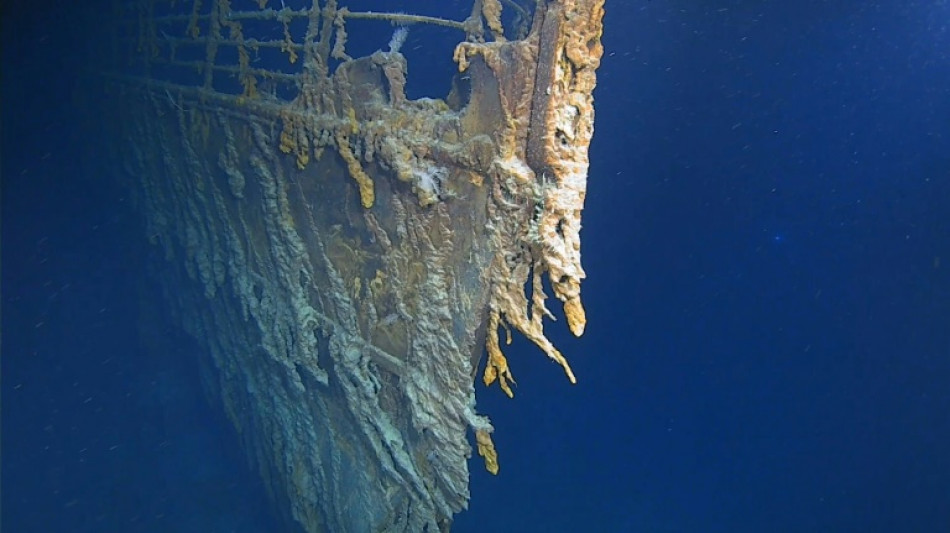
-
 Israeli security cabinet to discuss ceasefire as US says deal 'close'
Israeli security cabinet to discuss ceasefire as US says deal 'close'
-
COP29 president blames rich countries for 'imperfect' deal

-
 No regrets: Merkel looks back at refugee crisis, Russia ties
No regrets: Merkel looks back at refugee crisis, Russia ties
-
IPL history-maker, 13, who 'came on Earth to play cricket'

-
 Prosecutors seek up to 12-year terms for French rape trial defendants
Prosecutors seek up to 12-year terms for French rape trial defendants
-
Laos hostel staff detained after backpackers' deaths

-
 Hong Kong LGBTQ advocate wins posthumous legal victory
Hong Kong LGBTQ advocate wins posthumous legal victory
-
Rod Stewart to play Glastonbury legends slot

-
 Winter rains pile misery on war-torn Gaza's displaced
Winter rains pile misery on war-torn Gaza's displaced
-
'Taiwan also has baseball': jubilant fans celebrate historic win

-
 Russia pummels Ukraine with 'record' drone barrage
Russia pummels Ukraine with 'record' drone barrage
-
Paul Pogba blackmail trial set to open in Paris

-
 Landmine victims gather to protest US decision to supply Ukraine
Landmine victims gather to protest US decision to supply Ukraine
-
Indian rival royal factions clash outside palace

-
 Manga adaptation 'Drops of God' nets International Emmy Award
Manga adaptation 'Drops of God' nets International Emmy Award
-
Philippine VP denies assassination plot against Marcos

-
 Hong Kong's legal battles over LGBTQ rights: key dates
Hong Kong's legal battles over LGBTQ rights: key dates
-
US lawmakers warn Hong Kong becoming financial crime hub

-
 Compressed natural gas vehicles gain slow momentum in Nigeria
Compressed natural gas vehicles gain slow momentum in Nigeria
-
As Arctic climate warms, even Santa runs short of snow

-
 Plastic pollution talks: the key sticking points
Plastic pollution talks: the key sticking points
-
Indonesia rejects Apple's $100 million investment offer

-
 Pakistan police fire tear gas, rubber bullets at pro-Khan supporters
Pakistan police fire tear gas, rubber bullets at pro-Khan supporters
-
Hong Kong same-sex couples win housing, inheritance rights

-
 Indonesia digs out as flooding, landslide death toll hits 20
Indonesia digs out as flooding, landslide death toll hits 20
-
Liverpool's old guard thriving despite uncertain futures

-
 Mbappe takes reins for Real Madrid in Liverpool clash
Mbappe takes reins for Real Madrid in Liverpool clash
-
As AI gets real, slow and steady wins the race

-
 China's Huawei to launch 'milestone' smartphone with homegrown OS
China's Huawei to launch 'milestone' smartphone with homegrown OS
-
Porzingis and Morant make triumphant NBA returns

-
 Hong Kong top court affirms housing, inheritance rights for same-sex couples
Hong Kong top court affirms housing, inheritance rights for same-sex couples
-
Philippines, China clashes trigger money-making disinformation

-
 Most Asian markets drop, dollar gains as Trump fires tariff warning
Most Asian markets drop, dollar gains as Trump fires tariff warning
-
England 'not quivering' ahead of New Zealand Test challenge

-
 Bethell to bat at three on England Test debut against New Zealand
Bethell to bat at three on England Test debut against New Zealand
-
Trump vows big tariffs on Mexico, Canada and China

-
 New Zealand and England to play for Crowe-Thorpe Trophy
New Zealand and England to play for Crowe-Thorpe Trophy
-
Scheffler, Schauffele and McIlroy up for PGA Player of the Year

-
 Trump to face less internal pushback in new term: ex-commerce chief
Trump to face less internal pushback in new term: ex-commerce chief
-
Extreme weather threatens Canada's hydropower future

-
 More than 34,000 register as candidates for Mexico judges' election
More than 34,000 register as candidates for Mexico judges' election
-
Australia ban cycling's Richardson for life after UK defection

-
 Internal displacement in Africa triples in 15 years: monitor
Internal displacement in Africa triples in 15 years: monitor
-
'Remarkable global progress': HIV cases and deaths declining

-
 Social media firms raise 'serious concerns' over Australian U-16 ban
Social media firms raise 'serious concerns' over Australian U-16 ban
-
Tiger to skip Hero World Challenge after back surgery

-
 MLB shifts six 2025 Rays games to avoid weather issues
MLB shifts six 2025 Rays games to avoid weather issues
-
US women's keeper Naeher retiring after Europe matches

-
 West Ham stun Newcastle to ease pressure on Lopetegui
West Ham stun Newcastle to ease pressure on Lopetegui
-
Arteta calls on Arsenal to show 'ruthless' streak on Champions League travels


The ship sank. Or did it? Titanic misinformation swirls
The Titanic inspired a tear-jerking blockbuster and expeditions to its watery gravesite -- including a fatal one this week -- but viral TikTok videos peddle a stunning conspiracy theory: the ship never sank.
More than a century after it went down in the North Atlantic Ocean, wild myths and urban legends about the luxury liner have continued to swirl, including that it was doomed by the curse of a mummified Egyptian priestess.
Even more striking are a wave of TikTok videos asserting that the Titanic did not sink at all. Many of them have racked up millions of views -- never mind that the claim fails to hold water.
"The Titanic never truly went under," said a video by a TikTok user called "The Deep Dive," which garnered more than four million views.
"Everyone is familiar with the tale of the unstoppable ship that perished after colliding with an iceberg, but perhaps that isn't the case."
The video opens with a dramatic portrait of the Titanic, its stern crashing against stormy waves, as an imperious male voice goes on to claim that it was swapped with its sister ship –- the Olympic.
He alluded to an oft-repeated conspiracy theory that the company that built the Titanic purposely sank the Olympic, another one of its ships, as part of an elaborate insurance fraud.
A similar TikTok video claiming "the Titanic never sank" garnered 11 million views. The video was removed earlier this year in what appeared to be a rare intervention after it was widely reported by the US media.
- Historical falsehoods -
TikTok's algorithm and engagement-based recommendation system, which creates personal feeds for users based on their preferences, makes it a powerful platform to propagate conspiracy theories, experts say.
"This makes it easier for this type of content to spread," Megan Brown, a senior research scientist at New York University's Center for Social Media and Politics, told AFP.
"The other factor that makes it easier for historical conspiracy theories to spread over other types of conspiracy theories or misinformation is that it's typically not moderated content."
While the platform says it removes posts that cross its threshold of "significant harm" –- such as violence or harassment –- other seemingly benign content laced with falsehoods remains untouched.
That approach, researchers say, underscores a key dilemma facing social media platforms: How to tackle an explosion of misinformation without giving users the impression that they are restricting free speech?
That gap in policy has given rise to a breed of users who flourish on the back of disproven conspiracy theories that generate strong engagement, such as the Earth is flat and the 1969 Moon landing was a hoax.
- 'Sad part' -
That also includes TikTok's Titanic influencers -- focused on the vessel that sank in 1912 during its maiden voyage from England to New York after hitting an iceberg.
The proliferation of Titanic conspiracy theories on the popular platform may appear benign compared to other falsehoods that result in real-world harm, but historians say it remains vital to debunk them.
They worry conspiracy theories will affect how a generation of young people –- who often rely on platforms such as TikTok as a primary source of information -- learn about the tragedy.
"The sad part is that many of the people following this sort of thing are teenagers," said Charles A. Haas, founder of the Titanic International Society, which is dedicated to research about the ill-fated ship.
"They are woefully unwilling to do digging," Haas told the New York Times.
TikTok influencers and celebrities are increasingly taking over from journalists as the main source of news for young people, according to a report published this month by the Britain-based Reuters Institute.
The report found that 55 percent of TikTok and Snapchat users and 52 percent of Instagram users get their news from "personalities" -- compared to 33-42 percent who get it from mainstream media and journalists on those platforms.
That was reflected in how millions of young users turned to TikTok this week for updates on the five people aboard a tourist submersible that vanished in the North Atlantic Ocean on their way to visit Titanic's seabed wreckage, on a $250,000 ticket.
All five died after the craft suffered what the US Coast Guard said was a "catastrophic implosion" in the ocean depths.
"What if this all is a cover up?" asked a young TikTok user, referring to wall-to-wall news coverage about the submersible.
"Is there something behind the scenes that we're not seeing?" he added, peddling another unfounded conspiracy in a video that racked up over 4.2 million views.
X.Matos--PC


